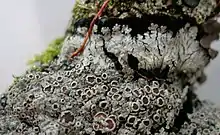Lepidocollema marianum
Lepidocollema marianum is a species of cyanolichen in the family Pannariaceae. It was first scientifically described by Elias Fries in 1825 as Parmelia mariana.[2] Per Magnus Jørgensen transferred it to the genus Lepidocollema in 2014 following a molecular phylogenetics-guided revision of the Pannariaceae.[3]
| Lepidocollema marianum | |
|---|---|
 | |
| Scientific classification | |
| Domain: | Eukaryota |
| Kingdom: | Fungi |
| Division: | Ascomycota |
| Class: | Lecanoromycetes |
| Order: | Peltigerales |
| Family: | Pannariaceae |
| Genus: | Lepidocollema |
| Species: | L. marianum |
| Binomial name | |
| Lepidocollema marianum | |
| Synonyms[1] | |
| |
The lichen has a growth form that is both squamulose (scaley) and foliose (leafy), with lobes around the margins and squamules in the centre of the thallus. It is firmly attached to the underlying substratum by root-like rhizines, which are brown to black in colour; the hypothallus is also black.[4]
Lepidocollema marianum occurs in Asia (including Thailand,[4] Sri Lanka,[5] and Taiwan[6]) and Mauritius.[7]
References
- "Synonymy: Lepidocollema marianum (Fr.) P.M. Jørg., in Ekman, Wedin, Lindblom & Jørgensen, Lichenologist 46(5): 651 (2014)". Species Fungorum. Retrieved 5 April 2022.
- Fries, Elias M. (1825). Systema Orbis Vegetabilis (in Latin). Vol. 1. Lundin: Typographia Academica. p. 284.
- Ekman, Stefan; Wedin, Mats; Lindblom, Louise; Jørgensen, Per M. (2014). "Extended phylogeny and a revised generic classification of the Pannariaceae (Peltigerales, Ascomycota)". The Lichenologist. 46 (5): 627–656. doi:10.1017/S002428291400019X.
- Rangsiruji, Achariya; Boonpragob, Kansri; Mongkolsuk, Pachara; Sodamuk, Mattika; Buaruang, Kawinnat; Binchai, Sutheewan; Lumbsch, H. Thorsten; Parnmen, Sittiporn (2016). "Diversity and phylogenetic survey of cyanobacterial lichens (Collematineae, Ascomycota) in mangrove forests of eastern Thailand". The Bryologist. 119 (2): 123–130. doi:10.1639/0007-2745-119.2.123. S2CID 87606344.
- Weerakoon, Gothamie; Wolseley, Patricia; Will-Wolf, Susan; Wijeyaratne, Chandrani (2020). "Corticolous lichen species as indicators of disturbed/undisturbed vegetation types in the central mountains of Sri Lanka". The Lichenologist. 52 (3): 233–245. doi:10.1017/s0024282920000109. S2CID 225891486.
- Ezhkin, Alexander K.; Ohmura, Yoshihito (2021). "Notes to Pannariaceae species in Taiwan". Taiwania. 66 (4): 575–579. doi:10.6165/tai.2021.66.575.
- Diederich, Paul; Ertz, Damien (2020). "First checklist of lichens and lichenicolous fungi from Mauritius, with phylogenetic analyses and description of new taxa". Plant and Fungal Systematics. 65 (1): 13–75. doi:10.35535/pfsyst-2020-0003. S2CID 226483993.
This article is issued from Wikipedia. The text is licensed under Creative Commons - Attribution - Sharealike. Additional terms may apply for the media files.